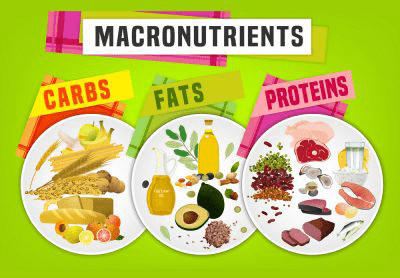Macro nutrients are nutrients that people need in relatively large quantities. Macronutrients are energy-providing chemical substances consumed by organisms in large quantities. The three macronutrients in nutrition are carbohydrates, lipids, and proteins.
What are Macronutrients?
Nutrients are environmental substances that are used for energy, growth, and bodily functions by organisms. These substances are needed in small amounts or larger amounts depending on the nutrient . Those that are needed in large amounts are called macronutrients.
There are three macronutrients required by humans: carbohydrates (sugar), lipids (fats), and proteins. Each of these macronutrients provides energy in the form of calories. For example:
- In carbohydrates, there are 4 calories per gram.
- In proteins, there are 4 calories per gram.
- And in lipids, there are 9 calories per gram.
This means that if you look at a food label and it lists 10 grams of carbohydrates, 0 grams of protein, and 0 grams of fat, that food would contain 40 calories.
Carbohydrates
Humans need carbohydrates in the largest amounts. Currently, the USDA recommends that adults get 45-65% of their daily caloric intake from carbohydrates. Carbohydrates are incredibly important to the diet for many reasons.
All of our bodily tissues have the ability to use the simple carbohydrate, glucose, as energy. When the body uses carbohydrates for energy, it can use other macronutrients for other jobs, like tissue growth and repair. Sugar, starch, and fiber are types of carbohydrates.
Sugars:
Sugars are simple carbs. The body quickly breaks down and absorbs sugars and processed starch. They can provide rapid energy, but they do not leave a person feeling full. They can also cause a spike in blood sugar levels. Frequent sugar spikes increase the risk of type 2 diabetes and its complications.
Fiber:
Fiber is also a carbohydrate. The body breaks down some types of fiber and uses them for energy; others are metabolized by gut bacteria, while other types pass through the body.
Fiber and unprocessed starch are complex carbs. It takes the body some time to break down and absorb complex carbs. After eating fiber, a person will feel full for longer. Fiber may also reduce the risk of diabetes, cardiovascular disease, and colorectal cancer. Complex carbs are a more healthful choice than sugars and refined carbs.
The brain, kidneys, muscles and heart all need carbohydrates to function properly, and carbohydrates aid in the synthesis of certain amino acids.
Carbohydrates are primarily found in starchy foods, like grain and potatoes, as well as fruits, milk, and yogurt. Other foods like vegetables, beans, nuts, seeds, and cottage cheese contain carbohydrates, but in lesser amounts. Carbohydrates can be simple or complex, which refers to their chemical structure. Simple carbohydrates taste very sweet (like fruit sugar), while complex carbohydrates taste savory (like starch in potatoes).
Fiber is an indigestible form of carbohydrate. Since humans cannot break down fiber carbohydrates, they pass through the digestive system whole and take other waste products with them. Diets low in fiber have problems with waste elimination, constipation, and hemorrhoids. Diets high in fiber have shown decreased risk for obesity, high cholesterol, and heart disease. Fruits, vegetables, and whole grain products all contain high amounts of fiber.
Proteins
Currently the USDA recommends 10%-35% of calories in the human diet come from protein. The typical American diet contains more protein than necessary. Proteins are also important in the diet for many reasons. Proteins consist of amino acids, which are organic compounds that occur naturally.
For example, protein is the major constituent of most cells, making up more than 50% of the dry weight. Also, protein defines what an organism is, what it looks like, and how it behaves. Proteins are used to produce new tissues for growth. These tissue repair and regulate and maintain body functions. Proteins may also be used as a source of energy when carbohydrates are not available.
There are 20 amino acids. Some of these are essential, which means people need to obtain them from food. The body can make the others. Protein is present in meats, poultry, fish, meat substitutes, cheese, milk, nuts, legumes, and in smaller quantities in starchy foods and vegetables.
Some foods provide complete protein, which means they contain all the essential amino acids the body needs. Other foods contain various combinations of amino acids.
Most plant-based foods do not contain complete protein, so a person who follows a vegan diet needs to eat a range of foods throughout the day that provides the essential amino acids.
Fats
Fats are essential for:
- lubricating joints
- helping organs produce hormones
- enabling the body to absorb certain vitamins
- reducing inflammation
- preserving brain health
Too much fat can lead to obesity, high cholesterol, liver disease, and other health problems.
However, the type of fat a person eats makes a difference. Unsaturated fats, such as olive oil, are more healthful than saturated fats, which tend to come from animals.
Water:
The adult human body is up to 60% water, and it needs water for many processes. Water contains no calories, and it does not provide energy.
Many people recommend consuming 2 liters, or 8 glasses, of water a day, but it can also come from dietary sources, such as fruit and vegetables. Adequate hydration will result in pale yellow urine.
Requirements will also depend on an individual’s body size and age, environmental factors, activity levels, health status, and so on.


